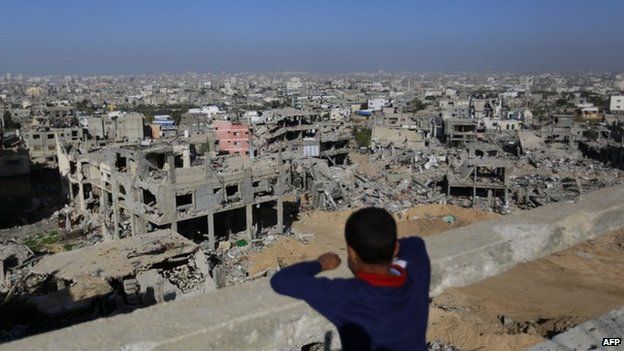Audit 'clears Islamic Relief' of terror funding claim
- Published

Britain's biggest Islamic charity says an audit of its activities in the Occupied Palestinian Territories has found no evidence to support accusations it has funded terrorism.
Islamic Relief Worldwide denied claims made first by Israel and later the United Arab Emirates and hired leading auditors to review its West Bank work.
The charity works with international organisations and governments, such as Unicef and the World Food Programme.
Israel has not responded so far.
Islamic Relief Worldwide works in more than 40 countries.
It started 30 years ago in Birmingham, where it was founded by a group of post-graduate students.
The UK government, through its international development arm DfID, gave Islamic Relief £3.2m in 2013.
The kind of work the charity does ranges from health and education projects, to help with orphans.
But earlier this year Israel claimed the charity was using its donations to fund the Palestinian group Hamas, which it and others sees as a terrorist organisation.
Islamic Relief suspended its work in the occupied West Bank - where the allegations were focused on - and commissioned the audit.
'Robust systems'
It says the audit, carried out over a few days in September this year, shows "absolutely no evidence" of any link to terrorism.
The audit saw projects run by the charity visited, the organisation's paperwork and procedures were examined, and staff and recipients of aid spoken to.
The report does throw up some minor accounting and procedural errors, but finds no evidence that funds have been diverted to Hamas or anyone else.
It also details a thorough screening process of staff, donors, and recipients of aid.
The charity is not publicly saying which company they paid to do the audit - but they do say it is a leading global audit firm.
Islamic Relief says because of what it calls the "sensitivities in the region" it has agreed with that firm not to identify it.
Neither the Ministry of Defence in Israel nor the Israeli embassy in London would comment on the report.
The UK's Charity Commission, which regulates charities, is understood to have received a copy of the report. It says Islamic Relief has done everything it should in keeping them informed of the Israeli allegations and its inquiry.
The UK government has suggested that they see no reason not to continue their relationship with the charity.
The Disasters Emergency Committee, which brings together 13 leading UK charities to deal with acute crises, said in a written statement that it "has considered the independent audit report which reviewed Islamic Relief's operations in Israel and the Occupied Palestinian Territories".
It added: "We are satisfied that Islamic Relief has robust systems in place to ensure aid money is properly accounted for and spent appropriately. The DEC is not aware of any evidence that Islamic Relief has used aid funds inappropriately in Israel and the Occupied Palestinian Territories."
Israel's shutting down of the charity in the West Bank has led to its £5m programme in that area ending. The charity say that has had an impact on the 78,000 people it had been helping.
Meanwhile, there is a wider concern among some development agencies concerning the work of other charities and NGOs in areas where proscribed groups are operating.
Workers in the field fear charities could be forced to limit their work in places like Somalia, Syria and Iraq, because of government and corporate fears that money destined for humanitarian projects in those areas could fall into the wrong hands.
Update 17 December 2014: In a statement, Israel's Shin Bet security agency said it was not possible to respond to IRW's announcement "without an in-depth examination of [the audit's] findings, its scope or who it was carried out by". It said the Israeli government's decision to declare IRW illegal was "based on information that has been accumulated over years, that the fund is a central player in financing of Hamas... [and] on accumulated knowledge and experience in fighting terror and financing of terror organisations".